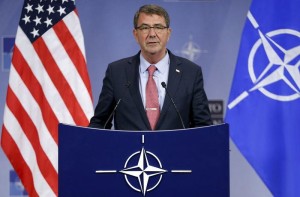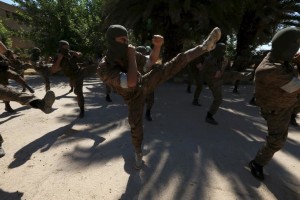U.S. pulls plug on Syria rebel training effort; will focus on weapons supply

U.S. Defense Secretary Ash Carter addresses a news conference during a NATO defence ministers meeting at the Alliance headquarters in Brussels, Belgium October 8, 2015. REUTERS/FRANCOIS LENOIR

Rebel fighters demonstrate their skills during a military display as part of a graduation ceremony at a camp in eastern al-Ghouta, near Damascus, Syria July 11, 2015. REUTERS/BASSAM KHABIEH
The United States will largely abandon its failed efforts to train moderate Syrian rebels fighting Islamic State, and instead provide arms and equipment directly to rebel leaders and their units on the battlefield, the Obama administration said on Friday.
The U.S. announcement marked the effective end to a short-lived $580 million program to train and equip units of fighters at sites outside of Syria, after its disastrous launch this year fanned criticism of President Barack Obama’s war strategy.
The Pentagon said it would shift its focus away from training to providing weapons and other equipment to rebel groups whose leaders have passed a U.S. vetting process to ensure they are not linked to militant Islamist groups.
The strategy switch comes as the Obama administration grapples with a dramatic change in the landscape in Syria’s four-year-old civil war, brought about by Russia’s military intervention in support of President Bashar al-Assad. Moscow’s intervention has cast doubt on Obama’s strategy there and raised questions about U.S. influence in the region.
Washington’s announcement came as Islamic State fighters seized villages close to the northern city of Aleppo from rival insurgents, according to a monitoring group, despite an intensified Russian campaign.
Moscow is mounting air strikes and missile attacks that it says are aimed both at supporting its longtime ally Assad and combating Islamic State. Washington says Russian air strikes in Syria are targeted primarily not at Islamic State but at other rebel groups, including those that have received U.S. support.
Obama has previously questioned the notion that arming rebels would change the course of Syria’s war. In an interview with the New York Times in August 2014, he said the idea that arming the moderate Syrian opposition would make a big difference on the battlefield had “always been a fantasy.”
By vetting only rebel commanders, the new U.S. policy could raise the risk that American-supplied arms could fall into the hands of individual fighters who are anti-Western.
Christine Wormuth, the Pentagon’s No. 3 civilian official, said however that the United States had “pretty high confidence” in the Syrian rebels it would supply, and that the equipment would not include “higher end” arms such as anti-tank rockets and shoulder-fired anti-aircraft rockets.
The Pentagon will provide “basic kinds of equipment” to leaders of the groups, Wormuth, Under Secretary of Defense for Policy, told reporters on a White House conference call.
The Syrian rebel groups that have recently won favor with Washington include Sunni Arabs and Kurds as well as Syrian Christians, U.S. officials have said.
Wormuth defended the Pentagon program launched in May that trained only 60 fighters, falling far short of the original goal of 5,400 and so working out at a cost so far of nearly $10 million per trained fighter.
“I don’t think at all this was a case of poor execution,” Wormuth said. “It was inherently a very, very complex mission,”
Ben Rhodes, the White House deputy national security adviser, said the new approach showed there had been “deficiencies” in the train-and-equip program that had to be addressed.
When it was launched, the program was seen as a test of Obama’s strategy of having local partners combat Islamic State militants and keeping U.S. troops off the front lines. But the program was troubled from the start, with some of the first class of fighters coming under attack from al Qaeda’s Syria wing, Nusra Front, in their battlefield debut.
The Pentagon confirmed last month that a group of U.S.-trained Syrian rebels had handed over ammunition and equipment to Nusra Front, purportedly in exchange for safe passage.
PROBLEMS RECRUITING
The administration has acknowledged that its efforts to attract recruits have struggled because the program was solely authorized to fight Islamic State, rather than Assad.
“No one in Syria is going to just fight ISIL … it’s doomed to fail with these restrictions,” Republican Senator Lindsey Graham said on MSNBC, using an acronym for Islamic State. Graham has been a leading critic of the Syria policy of Obama, a Democrat.
Pentagon spokesman Peter Cook said in a statement that the plan was to supply rebel groups so that they could “make a concerted push into territory still controlled by ISIL.”
The United States would also provide air support to rebels as they battle Islamic State, Cook said.
U.S. Defense Secretary Ash Carter said in the statement he believed the changes would “over time, increase the combat power of counter-ISIL forces in Syria.”
U.S. support would now focus on weapons, communications gear and ammunition, another Pentagon official said, speaking on condition of anonymity, adding the re-envisioned program would start in “days.” The official declined to say how many Syrian rebel leaders would be trained.
Another U.S. official said the new weapons supplies could eventually be channeled through vetted commanders to thousands of fighters, but declined to be more specific about the numbers.
The Pentagon did not name which groups would receive support.
Reuters reported last week that the Obama administration was considering extending support to thousands of Syrian rebel fighters, including along a stretch of the Turkey-Syria border, as part of the revamped approach to Syria.
The United States would also support members of the Syrian Arab Coalition, under that plan.
Speaking to reporters during a visit to London, Carter said the new U.S. effort would seek to enable Syrian rebels in much the way the United States had helped Kurdish forces to successfully battle Islamic State in Syria.
After Islamic State’s brutal offensive through northern Iraq in June 2014, Obama asked Congress for an initial $500 million to “train and equip” Syria’s opposition fighters, whom he later described as “the best counterweight” to Islamic State militants and a key pillar in his campaign to defeat them.
(Additional reporting by Doina Chiacu, Roberta Rampton, Idrees Ali, Matt Spetalnick and Warren Strobel.; Editing by Richard Balmforth and Frances Kerry)
In: reuters
